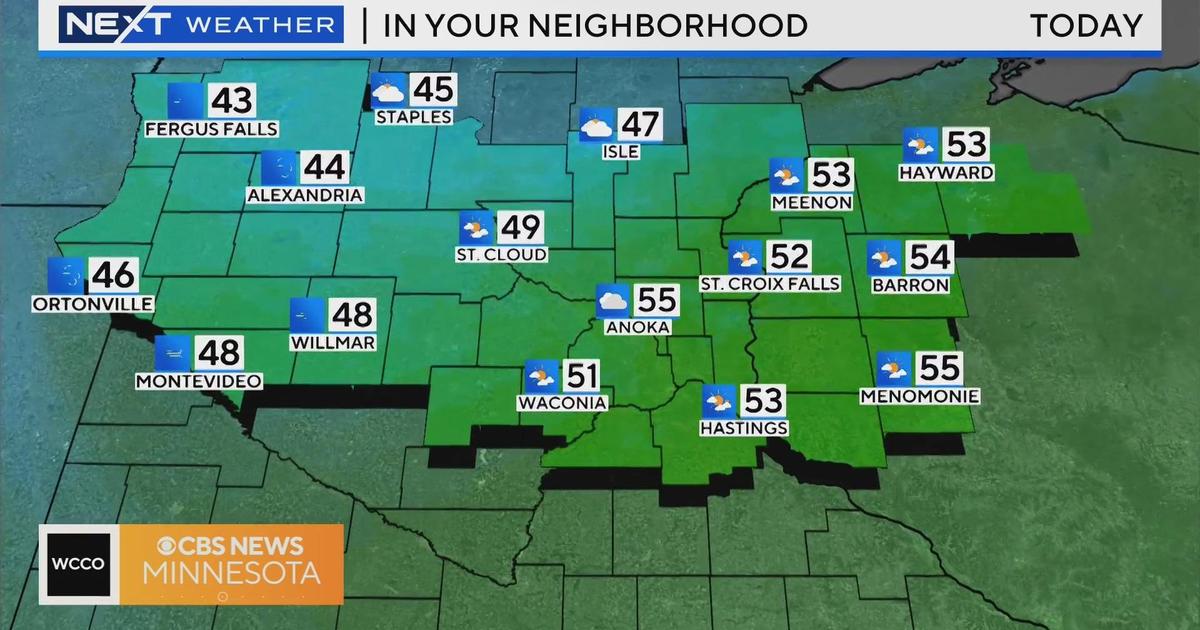Restaurants Adjust To Relaxed COVID Restrictions In Minnesota
MINNEAPOLIS (WCCO) — Gov. Tim Walz on Friday announced he would increase capacity limits on businesses and extend restaurants' operating hours until 11 p.m., citing declining hospitalizations and low COVID-19 test positivity rates.
The changes will take effect at noon on Saturday. This comes as the state has a seven-day test positivity rate of 3.9%--the lowest it's been since late June. More than 800,000 Minnesotans have had at least one dose of the vaccine.
"We can make these cautious, common sense adjustments to support them because of the progress we have made controlling the spread of COVID-19 and getting the most at-risk Minnesotans vaccinated," Walz said.
Restaurants and indoor entertainment maintain 50% capacity limits but now can have up to 250 people maximum, which is an increase from 150. For gyms, it's 250 people or 25% capacity.
He increased receptions and private parties from 15 people to 50 at the most, and restaurants can open one hour longer until 11 p.m.
An extended curfew is welcome news for business owners who say it could draw more customers with later reservations.
"We probably lost you know 40 to 50 people on a Friday. And then another 40 to 50 on a Saturday that wouldn't come out past 7:30 or eight o'clock because of [the 10 p.m. curfew]," said Bill Kozlak, owner of Jax Cafe in Northeast Minneapolis. "So it's significant for sure."
Gavin Kaysen, chef and owner of Spoon and Stable, echoed those comments, saying the move could allow 9 p.m. seating. He also said that the extra hours will also provide a better service experience for customers.
"I'm excited to see the 11 p.m. It's funny because we were actually talking about it yesterday. We were like 'if you could just do from 10 to 11 that would be so awesome," Kaysen said. "It's actually not a matter of doing more guests or doing more covers. It's just a matter of being able to offer more genuine hospitality and not having the guests feel rushed."
Both said that the increased capacity limit to 250 people will have little effect on several restaurants that are not large enough to meet that threshold and still be at 50% capacity, especially with social distancing requirements for tables.
"If the governor said tomorrow 'you can be at 100% but you have to keep your tables six feet apart,' it would be impossible to get to 100%," said Kozlak, whose restaurant could see a bump in indoor offerings as a result of the change because it can normally seat 600.
Business owners and the hospitality industry have pushed for more transparency about benchmarks for reopening and have pleaded for more of a notice when changes to the state's dial back are coming.
Friday's announcement came just 24-hours before the new executive order will take effect and on the eve of Valentine's Day weekend, which is one of the busiest times of year for restaurants.
"We will take what we can get," Kozlak said, but week to 10 days'—or better, two weeks'—notice would make a "big difference."
Walz on Friday acknowledged the short turnaround, but said the course of the virus can change quickly and he wants to see a 14-day trend before making any call.
Earlier this week, the governor signaled there wouldn't be imminent changes to restrictions, pressing that there won't be a "date certain" for reopening businesses.
Minnesota right now has seen some of the best test positivity rates since the summer. There wasn't a post-holiday surge that officials feared might happen.
"No, that doesn't give them enough lead time. No, it is disruptive," Walz said. "But to make those changes with the science in mind gives them the opportunity."
Republicans were swift to criticize the move, saying Walz "refused" to work with businesses or the legislature to find a way forward. GOP lawmakers have put forward a proposal that would roll back the governor's executive powers and implement a plan to reopen 100% by May 1.
"Continuing to go it alone with emergency powers and universal control over the dials is unwise," said Senate Majority Leader Paul Gazelka, R-Nisswa, in a statement. "It leaves Minnesotans without clear expectations for future changes affecting their livelihoods and ability to support their families."



